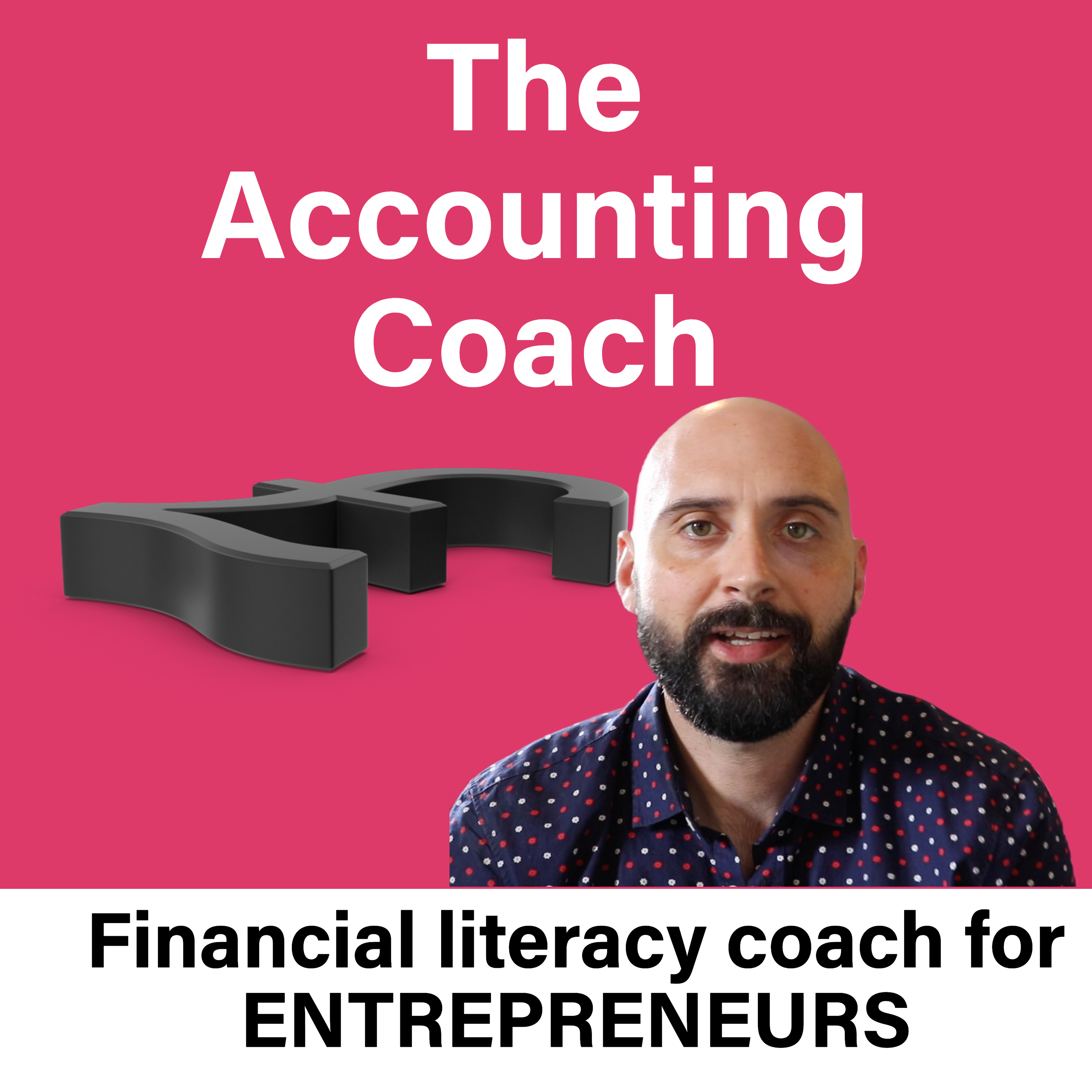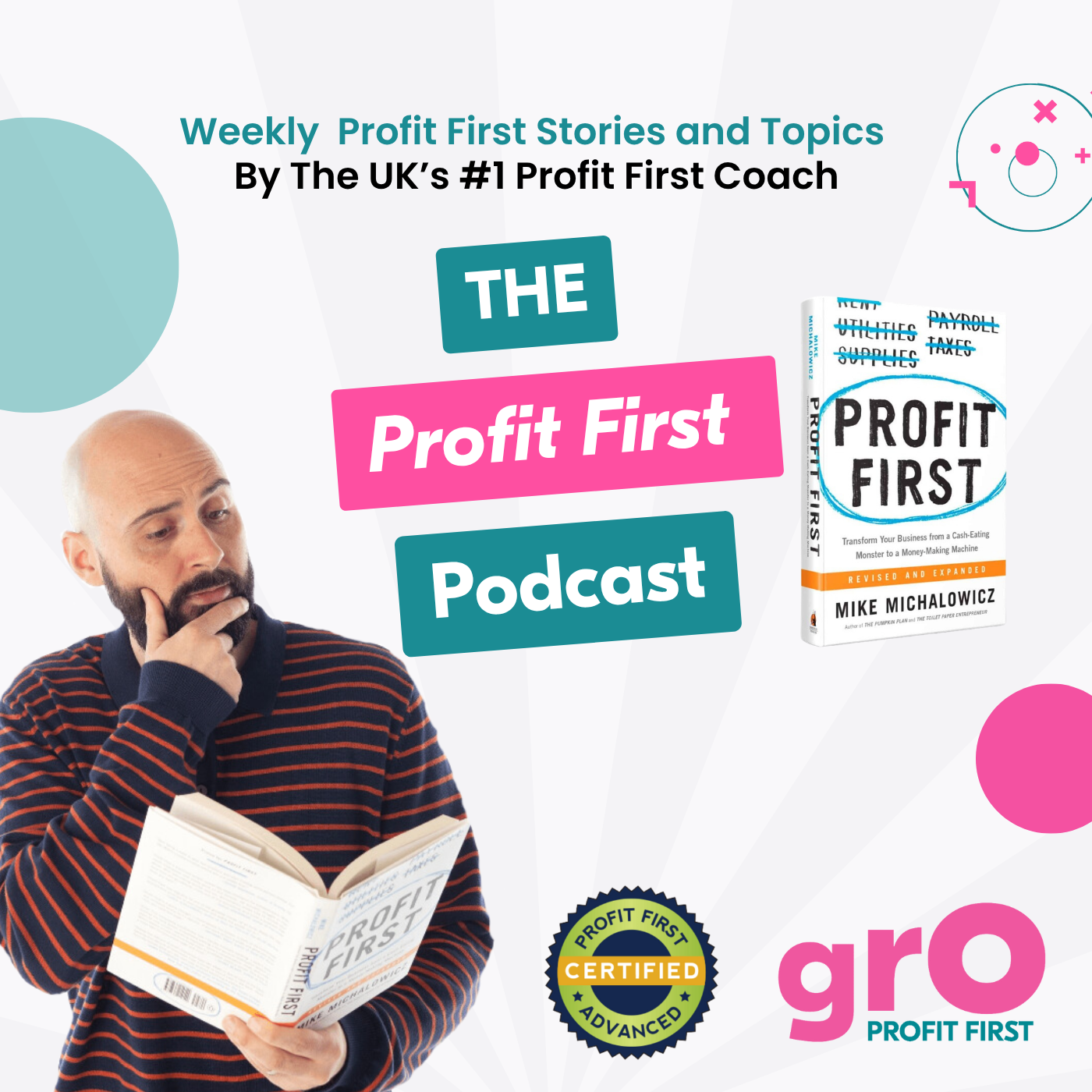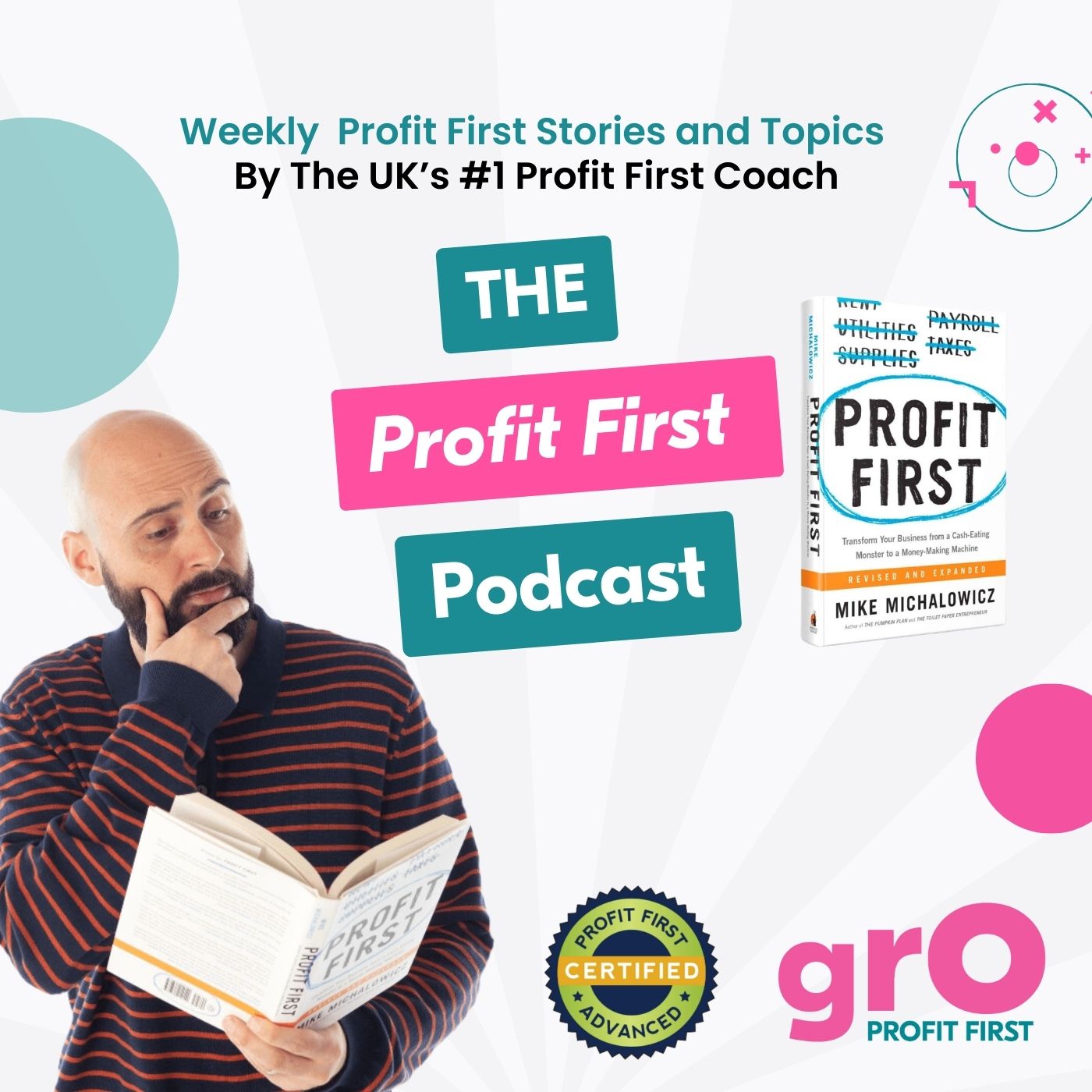Episode Transcript
[00:00:00] Excuses. Here I am. So.
[00:00:05] Hi, guys. Stephen Edwards from the Profit first podcast.
[00:00:09] I'm the founder, the director of Grow Profit First Accountants, and we help business owners build a more successful business, basically pay themselves more money and put more cash in the bank, largely using the Profit first system.
[00:00:23] We're a chartered certified firm of accountants with Profit first specialists. But this podcast is not just about the Profit First System. It's about any. Anything that can actually help you build a better business and essentially have a kind of better life as a business owner. And that's one of my personal passions. So what I want to talk about today, because I'm around a lot of business owners, I'm in a lot of different business communities and have been over the last few years. I've learned a lot. I've read a lot of books, listened to a lot of books, but paid to go on a lot of workshops, masterminds, courses. And one of the biggest, biggest challenges I see with business owners is they think they need to do it all themselves.
[00:01:06] And I just want to kind of dive into that. And I think this could be the barrier, literally the biggest obstacle that's stopping you from going to that next level as a business.
[00:01:17] And the truth is, you know, if you've read the book who, not how, which I'm an absolutely huge fan of, I am talking a little bit about that, but I'm not just talking about finding other people. I'm also talking about prioritizing, knowing what you're good at, how to spend your time, how to stop chasing shiny objects. So a lot of business owners, they kind of dabble, you know, they're the jack of all trades master and none. They do a little bit marketing, they do a bit of social media, do a bit sales. They. They do the actual doing, and, and they kind of, you know, they can't do all of it. And I had a chat with a prospect recently, and he kind of started the conversation saying, I know a lot. He said, and I don't take anything away from someone when they tell me they know a lot, but it's kind of worn like it's a badge of honor. You know, I, I know all this stuff. I know business, I know marketing, I know sales. And, you know, I, I really, you know, kind of beg you, if you're listening to this, to have an open mind, to always be a student, always figure out there's something you don't know, there's something you need to learn. Because if you have that mindset, you know everything, there's two Things wrong with it. Firstly, you're not open to learning new things. But secondly, which is the nature of this week's podcast episode, is is you think that it needs to be you. You think that you need to be the expert at everything.
[00:02:37] And the truth is you can't be the expert at anything. So the whole concept of, of who, not how is can you find who's. And there's a big distinction with this, by the way. Huge distinction. I speak to a lot of people about the who, not how concept, and some people get it wrong. It's not just as simple as finding someone to delegate to. If you find a real who is going to really help you get a breakthrough in your life and your business, the who, the person is better at that thing than you are. That is when the whole world changes for you as a business owner, you don't just find someone to do your social media, you find someone who can do it better than you. You don't just find someone to do your bookkeeping, you find someone who can do it better than you. As I mentioned, I had to chat with this business owner. One of the things, he wants to do all of his own bookkeeping, which is absolutely fine, but I was trying to give him some tips and tricks. And, you know, I've got 20 years experience in the industry as a working in chartered accountancy practices, and we've got hundreds of clients and, you know, we've seen what people do well, what they not do so well, and there's nothing wrong, wrong at all with doing your own bookkeeping. But he's at the size now where he could let go of his bookkeeping, but his mindset was basically, no one can do it like me. I have to do it, I need to do it. And you know, in business and life, we want to have more choice. We don't want to feel hostage. We start our business to get that freedom. And if you're holding on to things in your business, you're trying to find time to like fit that little book in or that course in or that workshop or that networking, and you're just trying to ram it all in and a little bit marketing at the end of the week, no wonder you're struggling. So the good news is there's an easier way of doing it. And you might be thinking, yeah, but Steve, I haven't got a huge business, it's just me. You might be thinking, I'm not even VAT registered at the moment. You know, I'm not necessarily a limited company and that's fine if that's you. And this applies to smaller and bigger businesses. But even if, you know, you are kind of a one man band, so to speak, this still applies because I'm not just talking about getting people, I'm talking about figuring out what are the things you should be spending most of your time on. And actually what I've learned is a lot of it comes down to the 8020 principle, the paretta principle.
[00:04:49] So, you know, a lot of people think of it in terms of revenue. And there's an expression saying Sometimes your top 20% customers or your top 20% services and products can give you 80% of your revenue. It's not an exact science, but it's closer to those sort of ratios than it is to 50 50.
[00:05:09] So what we're talking about when I'm talking about making your life easier as a business owner is how can you focus on the 20% of the things that are going to give you 80% of the impact? And I just want you to think about that for a moment, how liberating that is for you as a business owner. Because if you're looking at your to do list, it's at the beginning of the week now when recording this, or we're about to start July, you're probably hearing this on the 1st of July.
[00:05:33] If you've probably got a huge to do list, you need to stop running your month and your calendar and your week and your quarter from your to do list because there will always be too much stuff to do and there's always something to do. And this comes back to you, you know, you, and you're not necessarily going to do that. A lot of that. Wow. But the truth is there's some things on that list you have to do. You haven't got a choice, you know, go through those, by all means, you've got to do those. And then there's other things which are way more important than others. Stephen Covey, the, The author of 7 Habits of Highly Effective People, which is one of the most amazing books you'll ever listen or read in your, in your life.
[00:06:12] He talks about the, I think people call it the Isoff matrix. And, and we can have a, a kind of matrix. And if you think of a, a box with four boxes and we've got a Y axis and an X axis, so basically vertical and horizontal and we've got high importance and we've got high urgence. And when you put, and that gives you four boxes, you know, the bottom box is, it's not important and it's not urgent. That's kind of quad for quadrant four. Box number one is this high importance and it's high urgence. But where we want to be spending our time is it's important, but it's not urgent. You want to spend your time on the things that are important but they're not urgent yet. Because if you leave them, they become urgent, they become deadline sensitive. And one exercise you could do is you could use the four quadrants, you know, and map it out and just Google Stephen Covey Covey's time matrix and just figure out what are the quad two things for you. What are the important but not urgent? Because I bet you they are most of your 20% activities.
[00:07:13] Even better, if you can find those 20% activities that you like to do, you're passionate about, you enjoy, that's going to make a huge difference. People talk about being more productive and, you know, slicing their time, having all these apps and I love apps, I love technology.
[00:07:28] But the truth is your energy matters if you've ever done something where you feel like you could just do it all day long because you absolutely love doing it. So ideally, you've probably even got a 20% out of the 20%, which are the stuff you love to do, you're really passionate about and you really enjoy doing them.
[00:07:44] So my takeaway is really, as a business owner, I want you to do less eventually. I want you to build an amazing team that's going to, that's really what. If you're going to grow a business, you've got to build a team that you. There's no two ways around it. But to get to that stage, if it's just you figure out what are your top 20% activities. Even if you have a team, you've probably. You could easily get dragged back in and you start basically becoming what they refer to as an octopus. And you know, there's your team members are the arms, the tentacles and you're the brain. You're just juggling more balls, you're managing more people.
[00:08:15] So it applies even if you've got a small team or a big team of what the 20% of the things are going to give you 80% of the impact in your business and your life. Cheers, guys. Speak to you soon. Excuses. Here I am. So.


